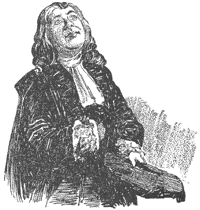|
The first three acts of TARTUFFE
were presented at Versailles, May 12, 1664. The play was first
produced in its present form, February 5, 1669, in Paris.
 ORGON, a well-to-do Parisian householder,
has been so deceived by the hypocritical cant of a poor beggar
named Tartuffe, that he has made the latter an honored guest
in his household. In no time at all Tartuffe has made himself
practically master of the house and the doings of its occupants.
Orgon, far from being incensed, ascribes this to Tartuffe's unselfish
interest in his, Orgon's, welfare. He is on the point, in fact,
of repudiating his promise to young Valère that he shall
marry Orgon's daughter, Marianne, in order that her hand and
her dower may go to Tartuffe and attach him permanently to the
family. ORGON, a well-to-do Parisian householder,
has been so deceived by the hypocritical cant of a poor beggar
named Tartuffe, that he has made the latter an honored guest
in his household. In no time at all Tartuffe has made himself
practically master of the house and the doings of its occupants.
Orgon, far from being incensed, ascribes this to Tartuffe's unselfish
interest in his, Orgon's, welfare. He is on the point, in fact,
of repudiating his promise to young Valère that he shall
marry Orgon's daughter, Marianne, in order that her hand and
her dower may go to Tartuffe and attach him permanently to the
family.
I an effort to save her step-daughter's romance, Elmire, Orgon's
wife, meets Tartuffe to beg him to refuse such a marriage. Tartuffe,
believing they are alone, proposes a clandestine love affair
to the wife of his benefactor. Orgon's son, Damis, steps forth
from a closet where he has been hiding during the interview,
just as Orgon enters the room. Damis denounces Tartuffe for the
scoundrel he is. Orgon, however, refuses to believe either his
son, Damis, or his wife, Elmire. Instead he disinherits his son
and drives him from the house. Not satisfied with these amends
to Tartuffe's wounded "innocence," he forthwith makes
Tartuffe a deed of gift for the house itself. He declares, moreover,
that the marriage with Marianne shall take place at once.
Elmire, in desperation, asks Orgon if he should behold Tartuffe's
treachery with his own eyes and hear it with his own ears if
he would believe. Upon Orgon's incredulous assent, she conceals
him under the table and leads Tartuffe on to a second avowal
of illicit love. When Orgon in righteous indignation orders him
from the house, Tartuffe reminds his benefactor that the house
is no longer his. In fact, the bailiff presently arrives to oust
Orgon and his family. At the same time Valère comes with
word that Tartuffe has reported Orgon to the King for harboring
property belonging to a political fugitive and that even now
Tartuffe and an officer are on their way to arrest him.
As Orgon is about to flee in Valère's carriage, Tartuffe
and the officer arrive. The hypocrite has at last overplayed
his hand, however. Upon his appearance before the King, His Majesty
had recognized him as a criminal with a long record and many
aliases. So now Tartuffe is arrested in Orgon's stead. His Majesty
graciously forgives Orgon his indiscretion on account of his
recent conspicuous bravery in military service. His property
is restored to him and Valère and Marianne are free to
marry with Orgon's blessing. |

